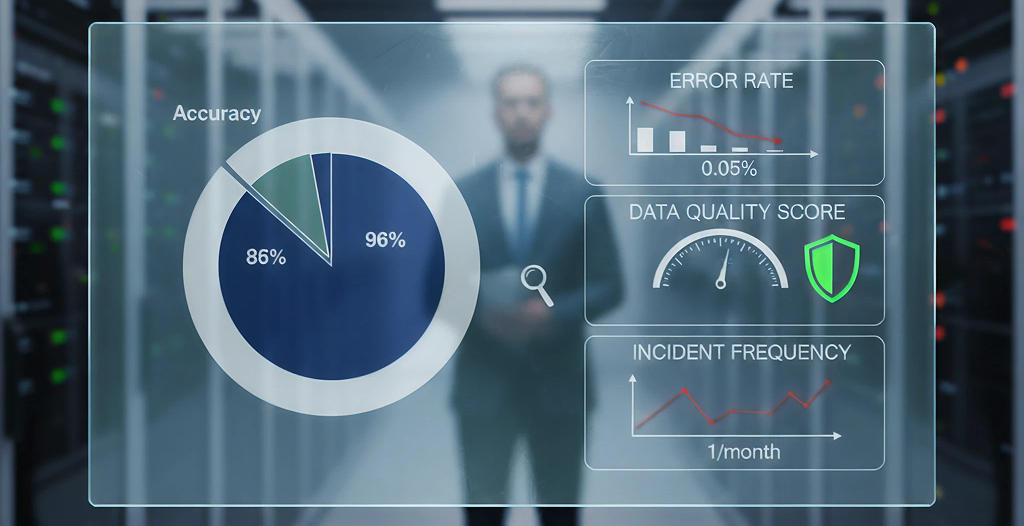Data Engineering & Data Quality: A Comprehensive Guide for Data Engineers

In today’s data-driven world, ensuring data quality is fundamental to business success. Poor-quality data can result in faulty analytics, inaccurate machine learning models, and poor decision-making. Whether you’re managing large datasets, creating pipelines, or transforming data, data quality must be a top priority.
This guide dives into the key aspects of data quality in data engineering and shows how platforms like QuantumDatalytica empower developers to build robust data pipelines while ensuring high-quality data throughout the process.
- $12.9 Million: Poor data quality is estimated to cost businesses approximately $12.9 million annually, according to Gartner.
- A Deloitte survey found that 67% of executives are uncomfortable using data from advanced analytics systems, even in companies with a solid data-driven culture.
- 37%: In the same Deloitte survey, 37% of executives still expressed discomfort using data from advanced analytics systems.
- 42%: According to a 2022 SAS survey, 42% of data scientists said that their “data science results were not used by business decision-makers” for analytical projects.
- Two-Thirds of Executives: A Cognizant and ESI ThoughtLab survey found that two-thirds of executives see AI as a crucial element for the future of their businesses, spurred by the rapid digital transformation during the coronavirus pandemic.
- Accuracy, Completeness, Consistency, Timeliness, Relevance: Data quality is comprised of these five essential dimensions that serve as the foundation for effective data governance.
As data continues to be at the heart of modern business operations, ensuring the quality of the data you collect, store, and process will determine the effectiveness of your analytics, machine learning models, and decision-making processes today and into the future.
In this article, we will:
- Ask the question: What is Data Quality?
- Explore why Data Quality is crucial for data engineering
- Discuss how to improve data quality
- Outline data quality best practices
- Share some recommended tools and resources for data engineers
Let’s dive in!
What is Data Quality?
Data quality refers to the condition of data as it flows through the system, and it is defined by several key attributes like accuracy, completeness, consistency, and reliability. When building data pipelines, data engineers must ensure that the data is clean, accurate, and processed in a way that aligns with business needs.
Key characteristics of data quality:
- Accuracy: The data must accurately represent real-world scenarios.
- Completeness: All the necessary data points are included and not missing.
- Consistency: Data should be uniform across different platforms or systems.
- Timeliness: Data must be up-to-date, ensuring real-time access for decision-making.
- Reliability: Data should be dependable and not subject to frequent changes or errors.
To ensure high-quality data, platforms like QuantumDatalytica offer seamless tools that help developers build and automate their data pipelines, ensuring that the data remains accurate and ready for analysis.
Data Quality Assurance in Data Engineering
Data quality assurance (QA) ensures that the data entering the system is clean, consistent, and ready for analysis. In data engineering, this process involves continuous validation, monitoring, and testing throughout the pipeline.
Key QA practices include:
- Validation: Ensuring that data meets predefined standards as it enters the pipeline.
- Testing Pipelines: Verifying the integrity of the data as it moves through different stages of the data engineering lifecycle.
- Data Profiling: Analyzing data to check for any patterns, inconsistencies, or errors.
- Continuous Monitoring: Implementing real-time tracking of data to identify potential issues immediately.
Developers using QuantumDatalytica can easily automate validation rules and data quality checks as part of their pipeline creation, ensuring high-quality data without manual intervention.
Data Quality Metrics and KPIs

To manage and optimize data quality effectively, it’s essential to track relevant data quality metrics and KPIs. These help data engineers evaluate how well the data adheres to quality standards and identify areas for improvement.
Essential data quality metrics:
- Accuracy: How closely data matches real-world conditions.
- Completeness: Percentage of missing or incomplete data.
- Consistency: The uniformity of data across systems.
- Timeliness: How quickly data is available for analysis.
- Uniqueness: Detecting and eliminating duplicate records.
Key KPIs:
- Error Rate: Percentage of incorrect or invalid data.
- Data Quality Score: Composite score that reflects overall data quality based on multiple metrics.
- Incident Frequency: Frequency of data quality issues detected during the pipeline process.
How to Improve Data Quality
Improving data quality is a continuous process that involves validation, monitoring, and regular reviews. Here’s how data engineers can actively enhance data quality:
- Data Governance: Implement clear policies and processes to manage data and define who is responsible for maintaining data quality.
- Automate Validation Rules: Integrate automated checks to ensure the incoming data is valid and accurate before it enters the pipeline.
- Standardize Data: Use consistent formats, naming conventions, and data structures throughout the pipeline to ensure uniformity.
- Real-Time Monitoring: Implement tools to monitor data quality continuously and immediately flag any issues.
- Stakeholder Collaboration: Work closely with business teams to ensure that the data is meeting the needs of end-users.
Data Quality Tools for Data Engineers
There are many data quality tools available to help data engineers streamline processes like data validation, cleansing, and profiling. Some of the most popular tools include:
- Talend: A platform that provides integration, transformation, and data quality tools.
- Informatica: A tool for data integration, data governance, and data quality management.
- Great Expectations: A Python-based tool designed for data validation and profiling.
- Apache Griffin: An open-source platform for data quality monitoring in big data systems.
- DataRobot: Offers data quality automation in machine learning pipelines.
With QuantumDatalytica, developers can build their own custom data quality checks within their automated pipelines, ensuring that the data remains clean and consistent as it flows through the system.
How to Handle Data Quality Issues
Even with the best systems in place, data quality issues can arise. Here’s how to address them effectively:
- Root Cause Analysis: Identify where the issue occurred—whether it’s a system error, human error, or data inconsistency.
- Data Cleansing: Use automated tools to clean and correct erroneous data, including removing duplicates or filling in missing values.
- Data Enrichment: Improve data completeness by adding external sources of data.
- Set Up Feedback Loops: Use real-time alerts and automated feedback to quickly address any emerging data issues.
Data Cleansing and Transformation
Data cleansing and transformation are essential steps in preparing data for analysis. Data cleansing involves removing errors, duplicates, and irrelevant information, while transformation ensures the data is in the right format.
Key steps:
- Remove Duplicates: Detect and eliminate redundant data entries.
- Handle Missing Values: Impute or remove incomplete data, depending on the context.
- Standardize Data: Ensure consistency in data formats, such as converting dates into a single format.
- Normalize Data: Adjust values to ensure uniformity across data points.
With QuantumDatalytica, developers can automate the entire data cleansing and transformation process, ensuring smooth, high-quality data flow across systems.
Data Quality Automation

Automating data quality processes is essential for ensuring consistency, accuracy, and efficiency in data pipelines. Automation reduces human error and ensures real-time monitoring and validation.
Key automation practices:
- Automated Profiling: Automatically check the quality of data at regular intervals.
- Real-Time Alerts: Get notified immediately when data quality issues occur.
- Continuous Monitoring: Track data quality throughout the entire pipeline process, ensuring that issues are flagged and addressed in real-time.
Data Quality in Cloud Environments
With businesses increasingly migrating to the cloud, managing data quality in cloud environments has become a critical task. Platforms like AWS, Azure, and Google Cloud offer scalable solutions, but they also introduce unique challenges, such as data fragmentation and integration issues.
Best practices for cloud data quality:
- Data Lineage Tracking: Keep track of the flow and transformations of data across cloud environments.
- Cloud-Native Tools: Use tools like Azure Purview or AWS Glue for data quality management.
- Real-Time Monitoring: Implement continuous data quality checks in the cloud environment.
Data Quality for Machine Learning
Machine learning models depend on high-quality data for accurate predictions. Poor-quality data can lead to unreliable models and flawed insights.
Best practices for ensuring data quality in machine learning:
- Preprocessing: Cleanse and prepare data by handling missing values and outliers.
- Feature Engineering: Select the most relevant features to enhance model accuracy.
- Bias Detection: Ensure the data is fair and free of bias to avoid skewed predictions.
- Validation: Use clean, high-quality data to test models before deployment.
Ready to create scalable and high-quality data pipelines? Start building your data engineering projects with QuantumDatalytica, the platform that makes data engineering and pipeline automation easy. Get started with QuantumDatalytica today.
FAQs
Data quality in data engineering ensures that data is accurate, complete, consistent, and reliable as it flows through the pipeline, enabling trustworthy analysis and decision-making.
A data engineer builds and maintains data pipelines, whereas a data quality analyst focuses on ensuring the data entering those pipelines meets the required standards of quality.
Yes, experienced data engineers with expertise in cloud computing, machine learning, and big data systems can earn salaries exceeding $500,000, especially in high-demand locations and industries.
The five key points of data quality are: Accuracy, Completeness, Consistency, Timeliness, Reliability
Expect questions about data pipeline architecture, tools for data validation and cleansing, troubleshooting techniques, and how you ensure data quality in large-scale systems
A typical roadmap includes mastering data engineering skills, such as programming languages (Python, SQL), data architecture, cloud platforms, and tools like Hadoop, as well as understanding data quality principles.
Recent Blogs
-
Workflow Automation 31 Dec, 2025
HIPAA-Compliant No-Code Data Pipelines for Healthcare Providers
-
Data Management Innovations 29 Dec, 2025
The Rise of AI-Powered Data Pipelines: What Every Business Should Know
-
Workflow Automation 28 Nov, 2025
Unlocking Nested Automation: Introducing the Workflow-within-Workflow Feature
-
Workflow Automation 21 Nov, 2025
Webhook vs. API: Which Trigger Works Best in QuantumDataLytica Workflows?
-
Expert Insights & Solutions 19 Nov, 2025
From CRM to Insights: How QuantumDataLytica Automates Lead Nurturing and Account Management
